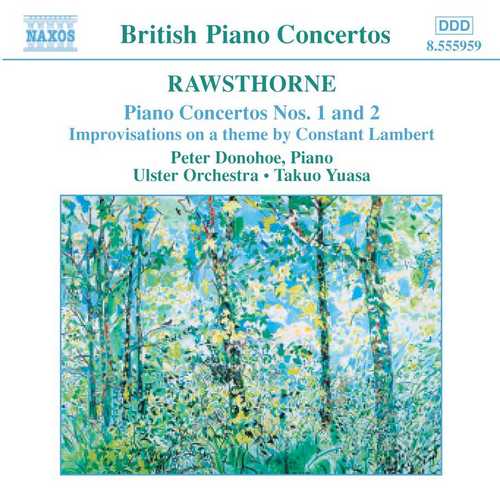
Composer: Alan Rawsthorne
Performer: Peter Donohoe
Orchestra: Ulster Orchestra
Conductor: Takuo Yuasa
Format: FLAC (tracks)
Label: Naxos
Release: 2003
Size: 478 MB
Recovery: +3%
Scan: yes
Piano Concerto No. 1
01. I. Capriccio: Allegro molto
02. II. Chaconne: Andante con moto
03. III. Tarantella: Vivace
04. Improvisations on a Theme of Constant Lambert
Piano Concerto No. 2
05. I. Allegro piacevole
06. II. Allegro molto
07. III. Intermezzo: Adagio semplice
08. IV. Allegro
Rawsthorne’s First Piano Concerto, originally written with just strings and percussion accompaniment, was introduced in its later full orchestral form at a 1942 Promenade Concert by Louis Kentner. The Second was commissioned by the Arts Council for the 1951 Festival of Britain and premiered by Clifford Curzon in the then-new Royal Festival Hall. He later recorded it with Sargent and the LSO on a 10-inch LP for Decca.
The Record Guide’s review commented on the ‘open air tune in the finale with an instant appeal’ and suggested the work would achieve the ‘wide popularity it certainly deserves’. Alas that never came about. Peter Donohoe plays the First with an effervescent lightness of touch that emphasises the scherzando element of the first movement.
Yuasa provides witty orchestral detail – there’s an engaging contribution from the bassoon – and yet still finds the underlying lyrical melancholy. He opens the Chaconne hauntingly, and the following dialogue with the piano has a compelling delicacy.
The Tarantella finale brings an infectious élan and splendid momentum. Donohoe’s brilliant solo contribution has all the sparkle you could want, and the gentle pay-off of the brief coda is neatly managed.
In the Second Concerto the fluidity of Donohoe’s playing is particularly appealing, and the overall balance – though the opening flute solo is perhaps a little recessive – is mostly admirable.
Donohoe and Yuasa deftly manage the quixotic changes of mood of the initally ‘rather violent’ Scherzo (the composer’s description) and lead naturally into the wistful Adagio semplice, with its nostagic clarinet cantilena answered so exquisitely by the piano.
The Improvisations are based on a seven-note theme from Lambert’s last ballet, Tiresias. They are widely varied in mood and style, and, even though Rawsthorne flirts with serialism, the variations are friendly and easy to follow, and the listener’s attention is always fully engaged.
Certainly this Naxos disc can be strongly recommended, especially to those who have not yet before encountered Rawsthorne’s always rewarding music.